De Chileense dichter en schrijver Roberto Bolaño werd geboren op 28 april 1953 in Santiago de Chile. Zie ook alle tags voor Roberto Bolaño op dit blog.
Uit:The Savage Detectives
« Asking Álamo these questions was, as I soon learned, a sign of my tactlessness. At first I thought he was smiling in admiration. Later I realized it was actually contempt. Mexican poets (poets in general, I guess) hate to have their ignorance brought to light. But I didn’t back down, and after he had ripped apart a few of my poems at the second session, I asked him whether he knew what a rispetto was. Álamo thought that I was demanding respect for my poems, and he went off on a tirade about objective criticism (for a change), a minefield that every young poet must cross, etc., but I cut him off, and after explaining that never in my short life had I demanded respect for my humble creations, I put the question to him again, this time enunciating as clearly as possible.
“Don’t give me this crap,” said Álamo.
“A rispetto, professor, is a kind of lyrical verse, romantic to be precise, similar to the strambotto, with six or eight hendecasyllabic lines, the first four in the form of a serventesio and the following composed in rhyming couplets. For example …” And I was about to give him an example or two when Álamo jumped up and cut me off. What happened next is hazy (although I have a good memory): I remember Álamo laughing along with the four or five other members of the workshop. I think they may have been making fun of me.
Anyone else would have left and never gone back, but despite my unhappy memories (or my unhappy failure to remember what had happened, at least as unfortunate as remembering would have been), the next week there I was, punctual as always.
I think destiny brought me back. This was the fifth session of Álamo’s workshop that I’d attended (but it might just as well have been the eighth or the ninth, since lately I’ve been noticing that time can expand or contract at will), and tension, the alternating current of tragedy, was palpable in the air, although no one could explain why.”
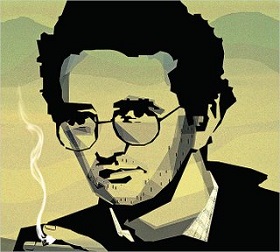
Roberto Bolaño (28 april 1953 – 15 juli 2003)
De Amerikaans schrijfster Nelle Harper Lee werd geboren in Monroeville op 28 april 1926. Zie ook alle tags voor Harper Lee op dit blog.
Uit: To Kill a Mockingbird
„Our mother died when I was two, so I never felt her absence. She was a Graham from Montgomery; Atticus met her when he was first elected to the state legislature. He was middle-aged then, she was fifteen years his junior. Jem was the product of their first year of marriage; four years later I was born, and two years later our mother died from a sudden heart attack. They said it ran in her family. I did not miss her, but I think Jem did. He remembered her clearly, and sometimes in the middle of a game he would sigh at length, then go off and play by himself behind the car-house. When he was like that, I knew better than to bother him.
When I was almost six and Jem was nearly ten, our summertime boundaries (within calling distance of Calpurnia) were Mrs. Henry Lafayette Dubose’s house two doors to the north of us, and the Radley Place three doors to the south. We were never tempted to break them. The Radley Place was inhabited by an unknown entity the mere description of whom was enough to make us behave for days on end; Mrs. Dubose was plain hell.
That was the summer Dill came to us.
Early one morning as we were beginning our day’s play in the back yard, Jem and I heard something next door in Miss Rachel Haverford’s collard patch. We went to the wire fence to see if there was a puppy–Miss Rachel’s rat terrier was expecting–instead we found someone sitting looking at us. Sitting down, he wasn’t much higher than the collards. We stared at him until he spoke:
“Hey.”
“Hey yourself,” said Jem pleasantly.
“I’m Charles Baker Harris,” he said. “I can read.”
“So what?” I said.
“I just thought you’d like to know I can read. You got anything needs readin’ I can do it. . . .”
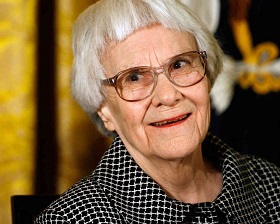
Harper Lee (Monroeville, 28 april 1926)
De Joods-Oostenrijkse dichter, schrijver en journalist Karl Kraus werd geboren in Jičin, Bohemen, Oostenrijk-Hongarije (thans Tsjechië) op 28 april 1874. Zie ook alle tags voor Karl Kraus op dit blog.
Ablaut der Liebe
Hast du die erste, wird sie dich bedrücken.
Dich zu befreien, mag der zweiten glücken.
Die dritte hast du, wieder dich zu bücken
bis du erliegst unendlichem Berücken.
Zweifel
Am Scheideweg der Worte muß man schwanken,
ob dies da besser oder jenes dort.
Denn der Gedanke hält nicht immer Wort,
jedoch das Wort hält mancherlei Gedanken.
Vor dem Schlaf
So spät ist es, so späte,
was werden wird, ich weiß es nicht.
Es dauert nicht mehr lange,
mit wird so bange,
und seh’ in der Tapete
ein klagendes Gesicht.
Allein bin ich, alleine,
was außerhalb, ich weiß es nicht.
Ach, daß mir’s noch gelänge,
mir wird so enge,
und seh’ in jedem Scheine
ein fragendes Gesicht.
Nun bin ich schon entrissen,
was da und dann, ich weiß es nicht,
ich kann sie nicht behalten
die Wahngestalten
und fühl’ in Finsternissen
das sagende Gesicht.
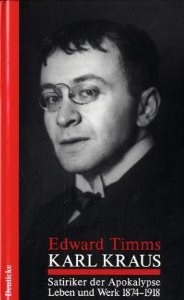
Karl Kraus (28 april 1874 – 12 juni 1936
Cover biografie
De Meso-Amerikaanse dichter en filosoof Nezahualcóyotl werd geboren in Texcoco op 28 april 1402. Zie ook alle tags voor Nezahualcóyotl op dit blog.
TEPONAZTLI DRUM SONG
Drum: titoco titoco titocoti
I, a quetzal feather, a bird of the flowering water, I flow in celebration. I am a song. In the wide wall of the water, my heart walks on the lips of the men. I am beautifying my flowers; with them the princes become intoxicated. There is adornment. Yayaye yahao.
I suffer, ay, my heart is desolate, I, a poet on the Shore of the Nine Currents. In the world of flowers, take pleasure, all of you, O my friends; already it is time to be adorned. Yahueha.
I put on a necklace of round jades, I, a singer, these are my payments. The jades sparkle, I exalt them in my song. They enrapture my heart. Let all be adorned in this flower world.
When I, a singer, sing on earth, my inner sadness departs. They enrapture my heart. Let all be adorned in the flower world beyond. Yahue aya.
I will leave a work of painted art. I, a singer whose songs will live on earth: with songs I will be remembered, O warriors, I will go away, I will disappear, I will be strewn on a mat of jewels and yellow feathers. The old women will cry for me. Their wails will drain my bones; as a flowery log I will be scattered there on the shore of the doves. Aya ohuaya.
Ayao ata ohuaye. Warriors, I suffer. I’m carried along on a canopy of feathers. In Tlapallan, smoke will disperse. I will go there, I will disappear, strewn on a mat of jewels and yellow feathers.
Vertaald door John Curl
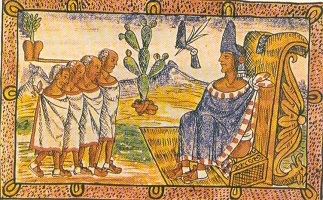
Nezahualcóyotl (28 april 1402 – 4 juni 1472)
Illustratie: koning Nezahualcóyotl in de Mexicaanse codices
De Tataarse dichter Ğabdulla Tuqay werd geboren op 28 april 1886 in Qoşlawıç in Kazan, Rusland (tegenwoordig Tatarstan). Zie ook alle tags voor Ğabdulla Tuqay op dit blog.
Ohne Titel
Wenn du es willst, dass dir erwidernd klingen
Die dunklen Saiten, tief ins Herz gespannt
Muss sich der Traurigkeit dein Lied verdringen
Schlag, Sänger, aus dem Sinn des Lachens Tand!
Das Meer des Lebens: finster, öd und träge
Sieh einem in die Seele, wers auch ist
Nicht eine Brust, wo ich verborgen läge
Im tiefsten Grund ein Leid, das zehrend frisst.
Lächelnde Mienen, wägen oder wagend
Doch dringt zum Herz dein Blick, du findest Gram
Dies Leben ist kein lachendes Gelage
Wo wesenlos ein Mensch ist ohne Harm.
Doch manchmal mit gefülltem Glas vergnügt sich
Ein Unglücklicher, seinem Schicksal freund
Dem armen Teufel scheint das Leben glücklich
Wie er sich klüger noch als alle träumt.
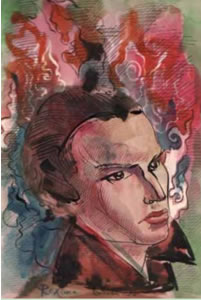
Ğabdulla Tuqay (28 april 1886 – 15 april 1913)
Portret door Roxana Gabi, 1996
Zie voor nog meer schrijvers van de 28e april ook mijn blog van 28 april 2013 deel 2.
